Where is Amitabha’s Pureland and how can Amitabha’s practice protect us from danger; Why Amitabha practice is all many people need
“Believing in inner truth means having deep faith that the ten billions Buddha-lands (worlds) are in reality not outside our Mind.” — Patriarch Ou-I
To the newcomer to Mahayana Buddhism, or particularly Pure Land Buddhism, Amitabha (Amita or Amida) and his Pure Land of Sakhavati can be confusing. What do we mean by Pure Land? Is it a metaphor? Or, is this like the Christian heaven? Isn’t Buddhism supposed to be a logical, self-directed path to Enlightenment? Understanding Amitabha Sutra requires an understanding of “absolute reality” and “Buddha Nature.” [Note: full Amitabha Sutra in English at end of this feature.]
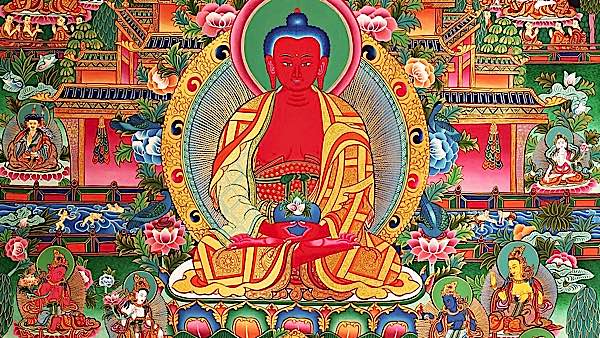
Not inside, not outside
Patriarch Ou-I wrote:
“The true essence of all the Great Vehicle (Mahayana) scriptures is Absolute Reality itself. What is Absolute Reality? It is the Pure Mind of sentient Beings. This mind is not inside, not outside, and not in between. It is not past, not present, and not future.”
In the same way, we could say Amitabha and Sukhavati Pure Land are “not inside, not outside, and not in between… not past, not present… not future.” Modern Buddhists tend to say, not a place out there” but rather, a place “within.” Since we all have “Buddha Nature” within, we all have Amitabha and His Pure Land within.
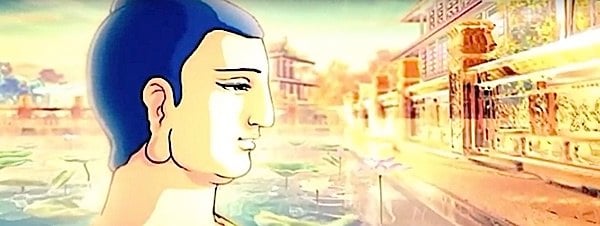
There is a saying: “If you are looking for the Pure Land, don’t look for it out there. You’ll find it in your heart.” — paraphrasing Professor Takamaro Shigaraki. (Note: heart equates to “Mind” in Buddhism, generally) [1]
One important method for drawing closer to Amitabha’s Pureland is chanting his Dharani and mantras. Chant along with Buddha Weekly:
Patriarch Ou-I concluded:
“Thus the one who speaks the sutra and the one who is spoken of, the Buddhas that can deliver sentient beings and the sentient beings who are delivered, the ability to believe and that which is believed in, the ability to take vows and that which is vowed, the ability to concentrate on the Buddha-name and the Buddha-name which is concentrated upon, the ability to be born in the Pure Land and birth in the Pure Land itself, the ability to praise the Buddhas and the Buddhas who are praised – all of these are the imprint of the “true seal” of Absolute Reality. In other words, the True Mind (Bodhi Mind) sentient beings is the essence of all Mahayana sutras.”
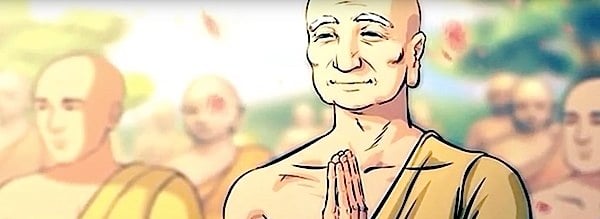
Different understandings, skillful means
It is probably because all students have different understandings, different capabilities and karmic imprints that Buddha taught many paths to ultimate realizations.
If one wishes to believe in the Pure Land as a paradise in the West where we go after death, this is not wrong. If one wishes to believe the Pure Land is a metaphor and that it exists only in the mind, this is also not wrong.
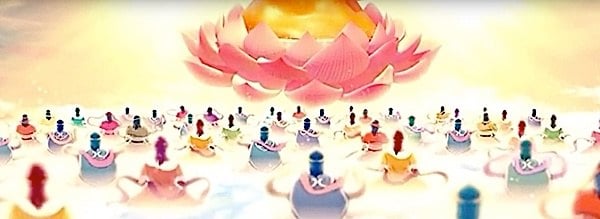
In his commentary on the Amitabha Sutra, Patriarch Ou-I wrote:
“Since there is really nothing outside of this Mind, we have deep certainty that the whole assembly of beings and surroundings in the Western Paradise is a set of reflections appearing in our mind. All phenomena are merged with inner truth, all falsity is merged with truth. All practices are merged with True Nature. All others are merged with oneself. Our own inherent mind is all-pervasive, and the Buddha- mind is also all-pervasive, and the true nature of the minds of sentient beings is also all-pervasive.”
What are the ten protections of Amitabha?
Video documentary on the Amitabha’s protection from the 10 dangers:
Who is Amitabha, the Limitless?
“…why is this Buddha called Amitabha? The light of this Buddha is infinite, and shines on all lands throughout the universe without obstruction. Thus this Buddha is called Amitabha. Also, the life span of this Buddha and his people is an infinite number of immeasurable eons, and so he is called Amitabha. Amitabha Buddha attained enlightenment ten eons ago.” — Shakyamuni Buddha from the Amitabha Sutra
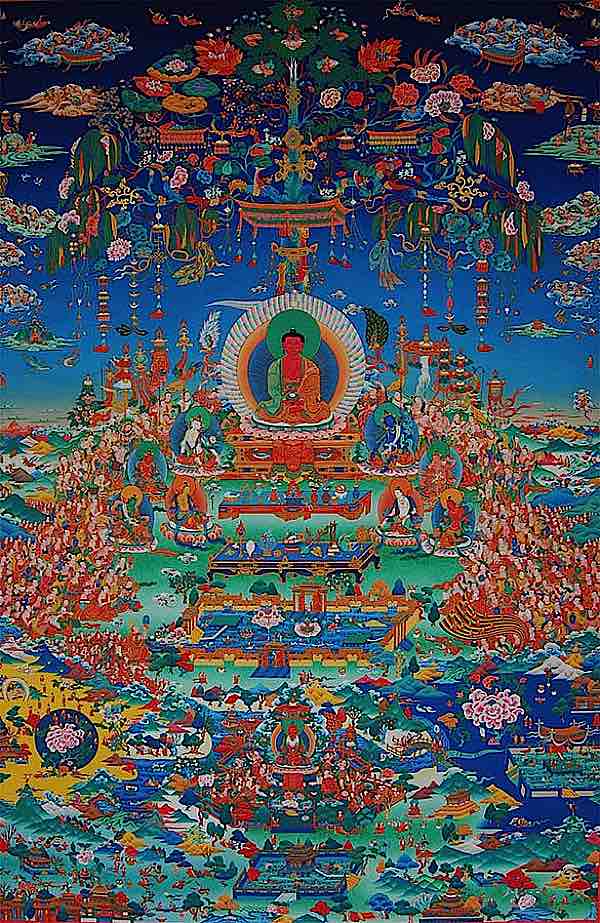
Amitabha — the most beloved of Buddhas after Shakyamuni Himself — is equally both difficult and easy to comprehend. Easy to practice, certainly. Simply chant his mantra, his name or his praise. Shakyamuni Buddha, in the Amitabha Sutra, taught that single-pointed contemplation on Amitabha, chanting his name at the moment of death, is the sure path to the Pure Land, the Western Paradise. Why then do we say “difficult?” Because faith is required; not blind faith, but faith in the skillful methods and teachings of the Buddha.
A lovely animated 20 minute film with the full Amitabha Sutra (English subtitles):
“If there are good men or good women who hear of Amitabha Buddha, and recite his name single mindedly and without confusion, for one day or two days or three days or four days or five days or six days or seven days, then when these people are about to die, Amitabha Buddha and all the sages who are with him will appear before them. When these people die, their minds will not fall into delusion, and they will attain rebirth in Amitabha Buddha’s Land of Ultimate Bliss. I have seen this benefit, and so I speak these words. If sentient beings hear what I say, they must make a vow to be born in that land.” — Shakyamuni Buddha in the Amitabha Sutra.
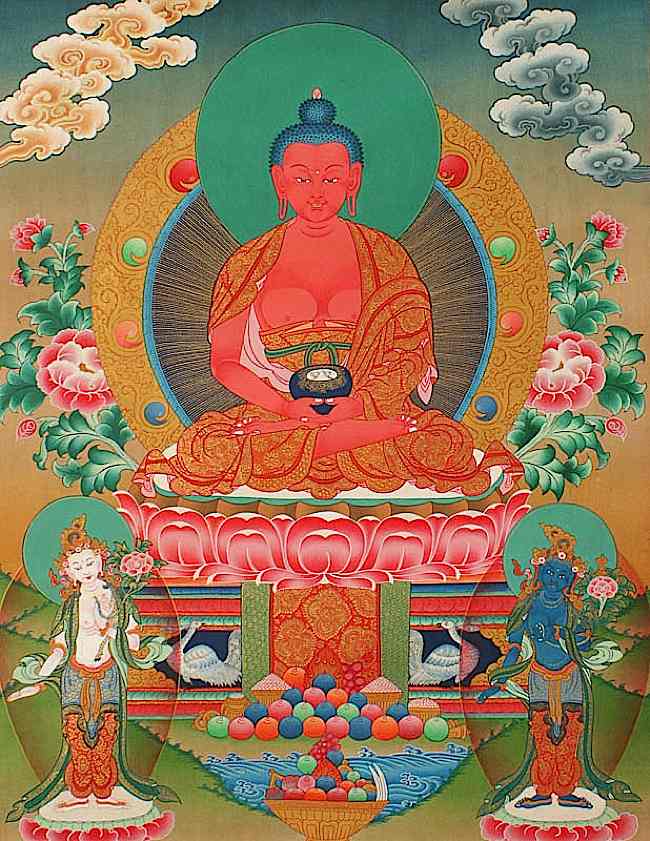
Amitabha’s powerful mantra:
Magic or Metaphor or Neither?
What did Shakyamuni Buddha mean when he taught we could obtain the Pure Lands after death? That we’d be magically swept up in the shining hand of the great and glorious Amitabha and whisked off to Paradise? Or, that, our single-pointed contemplation and visualization would help us overcome the obstacles, obscurations and karmic imprints of our troubled minds? Or somewhere in between?
It doesn’t matter, which extreme you believe with regard to Pure Land — actual paradise, metaphor, mind, or something else — the point is to single-pointedly concentrate on the ideal perfection of Amitabha. Ultimatley, this perfection is also within us, since Shakyamuni Buddha taught us that all sentient beings have Buddha Nature within.
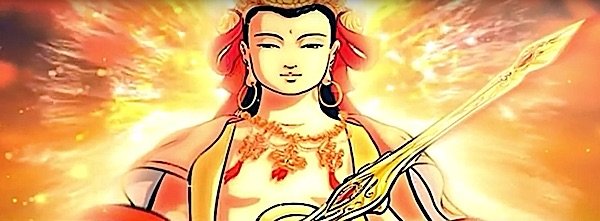
Does that mean that we shouldn’t believe in a substantial place, Sukhavati, the glorious Pure Land? The best answer is, we shouldn’t overthink it, because ultimately it doesn’t actually matter. At the level of ultimate reality, all things are Oneness or Emptiness, therefore even what we perceive to be our ordinary world is not a “substantial” reality either. It is dependent on other — dependent arising. At the level of mind, all things are possible and real. If all things are dependent on mind, so too, is the Pure Land. So, if the Pure Land is not objectively real, in the sense of jeweled mountains and birds who proclaim the Dharma, it makes no difference. If it was objectively real at the relative level, at the ultimate level it still would make no difference.
The point of this practice is to fully engage body, mind and speech in Dharma, and thus purify our minds of obscurations and leave no room for obstacles and cravings. Then, we approach paradise. Peace. Stillness. And, the opportunity to develop realizations.
Why recite the name of Amitabha?
There are many methods taught by Shakyamuni Buddha to attain realizations. Many are difficult and take a lifetime (or lifetimes) to attain. All require we remove our cravings and attachments and obstacles. And, arguably, the simplest one is the recitation of Amitabha’s name or mantra. Why?
Patriarch Ou-i explains:
“If a purifying pearl is put into dirty water, the dirty water cannot but be purified. If the Buddha-name is put into a chaotic mind, even that chaotic mind cannot fail to become enlightened… Reciting the Buddha-name with faith and vows is a true cause for the Supreme Vehicle.”
Just, as we focus on breath in mindfulness practice to help develop realizations, here, in Amitabha pratice, we focus one-pointedly on the magnificence of Amitabha Buddha and the Pureland — and especially His name. When we do, all doubts, pains, fears, illnesses, cravings and attachments disappear — there is no room for them at all. It’s not necessarily magic (although it can be magical) but simply that all these sufferings of samsara have no room to arise when we are focused on this one, magnificent meditation.
Body, Speech and Mind
In Amitabha practice we typically engage in “speech” practice” — focusing one-pointedly on the name or mantra. But, at another level we also engage body, speech and mind:
- Body: we sit in contemplation, we might count our recitations on a mala, or we might engage in prostrations, drumming on a fish drum or other “body” repetitive actions.
- Mind: we one-pointedly contemplate the stunning glorious visualization of Amitabha and Western Paradise.
- Speech: we normally chant the name of Amitabha. In Pureland Buddhism, “Namo Amitabha” (Sanskrit), “Namo Amitofu” (Chinese) or “Om Ami De Wa Hrih” (mantra of Amitabha.)
Mantra of Amitabha chanted:
In the Amitabha Sutra, Shakyamuni teaches there are countless Pure Lands, and names many of the Buddhas and their Pure Lands. Ultimately, he concludes:
“Why do you think this is called the sutra that is protected and kept in mind by all the Buddhas? If there are good men and good women who hear this scripture, accept it, and uphold it, and they hear the names of all these Buddhas, all these good men and good women will be protected and kept in mind by all these Buddhas, and all of them will reach the level where they do not turn back from complete, unexcelled, correct enlightenment. Therefore, all of you should faithfully accept what I say and what all the Buddhas have said.”
Amitabha Sutra
Translated into Chinese by Tripitaka Master Kumarajiva
Translated from Chinese into English by J.C. Cleary
Thus have I heard:
Once Buddha was in the land of Shravasti, in the garden of Jeta and Anathapindika. He was accompanied by twelve hundred and fifty great Bhikshus, all of them great Arhats, well known to the assembly. Among them were his leading disciples, such figures as the Elders Shariputra, Maudgalyayana, Mahakashyapa, Maha Katyayana, and Mahakausthila, Revata, Suddhipanthaka, Nanda, Ánanda, Rahula, Gavampati, Pindola-bharadvaja, Kalodayin, Mahakapphina, Vakula, and Aniruddha, etc., all great disciples. Also present were the Bodhisattvas Mahasattva: Manjushri, Prince of the Dharma, the Bodhisattva Ajita the Invincible, and the Bodhisattva of Constant Progress, Gandhahastin, Nityodyukta, and other such great enlightening beings. Also present was Shakra, the king of the gods, along with countless numbers of heavenly beings, making up a great assembly.
At that time Buddha said to the Elder Shariputra: “West of here, past a hundred billion Buddha-lands, there exists a world called “Ultimate Bliss”. In this land there exists a Buddha called Amitabha, who is expounding the Dharma right now.
[Buddha says to Shariputra:] “Why is this land called Ultimate Bliss”? It is called “Ultimate Bliss” because the sentient beings in this land are free from the myriad sufferings, and only know every kind of joy.
Furthermore, this land is called “Ultimate Bliss” because it is surrounded by seven rings of railings, and seven layers of nets, and seven rows of trees, all made of the four precious jewels.
Moreover, the Land of Ultimate Bliss has many jeweled ponds filled with the waters of eight virtues. The bottom of each of the ponds is pure golden sand, and the stepped walkways that lead up from all four sides of each of the ponds are made of gold, silver, lapis lazuli and crystal. Above the ponds there are towers which are adorned with silver and gold and lapis lazuli and crystal and mother of pearl and red agate. In the ponds there are lotus flowers as big as cart wheels: blue ones shining with blue light, yellow ones shining with yellow light, red ones shining with red light, and white ones shining with white light, each emitting a subtle pure fragrance.
The Land of Ultimate Bliss is complete with all these merits and adornments.
And there is more — celestial music is constantly playing in this Buddha-land, and the ground is made of tawny gold. Flowers in the shape of heavenly orbs rain down at all hours of the day and night. Every morning the sentient beings of this land decorate their garments with multitudes of wondrous flowers and make offerings to hundreds of billions of Buddhas in other worlds. When it is meal time, they return to their own lands, to eat and circumambulate [the teaching assembly].
The Land of Ultimate Bliss is complete with all these merits and adornments.
And there is more still — in this land there are birds of all sorts of wondrous variegated colors: white cranes, peacocks, orioles, myna birds, cuckoos. All these birds bring forth harmonious songs day and night. Their songs communicate such Buddhist teachings as the five roots, the five powers, the seven factors of enlightenment, the eightfold path, as well as other teachings. When the sentient beings in this land hear the voices of the birds, they are mindful of the Buddhas, mindful of the Dharma [Buddha’s teachings], and mindful of the Sangha [Community of Seekers of Enlightenment].
Do not think that these birds were born as birds due to karmic retribution for past misdeeds. Why not? In this Buddha-land, the three evil planes of existence (as animals, hungry ghosts, and hell-beings) do not exist.
In this Buddha-land even the names of the evil planes of existence do not exist, much less the realities. All these birds are the creations of Amitabha Buddha, fashioned in order to broadcast the sounds of the Dharma.
In this Buddha-land, there is a slight breeze that stirs the rows of jewel trees and jewel nets, so that they emit subtle wondrous sounds, like hundreds and thousands of melodies playing all at once. All those who hear these sounds spontaneously develop the intention to be mindful of the Buddha, mindful of the Dharma, and mindful of the Sangha.
This Buddha-land is complete with all these merits and adornments.
What do you think: why is this Buddha called Amitabha?
The light of this Buddha is infinite, and shines on all lands throughout the universe without obstruction. Thus this Buddha is called Amitabha.
Also, the life span of this Buddha and his people is an infinite number of immeasurable eons, and so he is called Amitabha.
Amitabha Buddha attained enlightenment ten eons ago.
Moreover, this Buddha has innumerable disciples, all of whom are Arhats, and whose numbers are incalculable. Amitabha also has a following of innumerable Bodhisattvas.
The Land of Ultimate Bliss is complete with all these merits and adornments.
None of the sentient beings who are born in the Land of Ultimate Bliss ever fall back into a lower realm [i.e., they are avaivartika]. Many among them have only one more lifetime [to go before enlightenment]. These beings are very numerous, and their number is incalculable: they can be spoken of as innumerable.
When sentient beings hear [of the Land of Ultimate Bliss], they must take a vow to be born in this land. Why so? So that they can be together with all these beings of superior goodness.
One cannot be born in this land through minor good roots, blessings, virtues and causal connections.
If there are good men or good women who hear of Amitabha Buddha, and recite his name single mindedly and without confusion, for one day or two days or three days or four days or five days or six days or seven days, then when these people are about to die, Amitabha Buddha and all the sages who are with him will appear before them. When these people die, their minds will not fall into delusion, and they will attain rebirth in Amitabha Buddha’s Land of Ultimate Bliss.
I have seen this benefit, and so I speak these words. If sentient beings hear what I say, they must make a vow to be born in that land.
Right now I am extolling the benefits of the inconceivable merits of Amitabha Buddha. But in the eastern direction there are also countless other Buddhas, like Akshobhya Buddha, and the Buddha “Marks of the Polar Mountain”, and the Buddha “Great Polar Mountain”, and the Buddha “Light of the Polar Mountain”, and the Buddha “Wondrous Voice”. Each of them preaches in his own land with the eloquence of a Buddha, and covers a whole cosmos, speaking the truth. All of you sentient beings should believe this scripture extolling their inconceivable merits, and which all Buddhas protect and keep in mind.
In the worlds of the southern direction there are countless other Buddhas, like the Buddha “Lamp of the Sun and Moon”, and the Buddha “Light of Renown”, and the Buddha “Great Flaming Shoulders”, and the Buddha “Lamp of the Polar Mountain”, and the Buddha “Infinite Progress”. Each of them preaches in his own land with the eloquence of a Buddha, and covers a whole cosmos, speaking the truth. All of you sentient beings should believe this scripture extolling their inconceivable merits, and which all Buddhas protect and keep in mind.
In the worlds of the western direction there are countless other Buddhas, like the Buddha “Infinite Life”, and the Buddha “Innumerable Characteristics”, and the Buddha “Innumerable Banners”, and the Buddha “Great Light”, and the Buddha “Great Illumination”, and the Buddha “Mark of Reality”, and the Buddha “Light of Purity”. Each of them preaches in his own land with the eloquence of a Buddha, and covers a whole cosmos, speaking the truth, All of you sentient beings should believe this scripture extolling their inconceivable merits, and which all Buddhas protect and keep in mind.
In the worlds of the northern direction there are countless other Buddhas, like the Buddha “Flaming Shoulders”, and the Buddha “Supreme Voice”, and the Buddha “Unstoppable”, and the Buddha “Born of the Sun”, and the Buddha “Netted Light”. Each of them preaches in his own land with the eloquence of a Buddha, and covers a whole cosmos, speaking the truth. All of you sentient beings should believe this scripture extolling their inconceivable merits, and which all Buddhas protect and keep in mind.
In the worlds of the nadir there are countless other Buddhas, like the Buddha “Lion”, and the Buddha “Repute”, and the Buddha “Light”, and the Buddha “Dharma Banner”, and the Buddha “Upholding the Dharma”. Each of them preaches in his own land with the eloquence of a Buddha, and covers a whole cosmos, speaking the truth. All of you sentient beings should believe this scripture extolling their inconceivable merits, and which all Buddhas protect and keep in mind.
In the worlds of the zenith there are countless other Buddhas, like the Buddha “Pure Voice”, and the Buddha “Sojourner King”, and the Buddha “Incense Fragrance”, and the Buddha “Fragrant Light”, and the Buddha “Great Blazing Shoulders”, and the Buddha “Body of Multicolored Jewel Flower Garlands”, and the Buddha “Sala Tree King”, and the Buddha “Precious Flower Virtue”, and the Buddha “Sees All Truths”, and the Buddha “Like the Polar Mountain”. Each of them preaches in his own land with the eloquence of a Buddha, and covers a whole cosmos, speaking the truth. All of you sentient beings should believe this scripture extolling their inconceivable merits, which all Buddhas protect and keep in mind.
Why do you think this is called the sutra that is protected and kept in mind by all the Buddhas?
If there are good men and good women who hear this scripture, accept it, and uphold it, and they hear the names of all these Buddhas, all these good men and good women will be protected and kept in mind by all these Buddhas, and all of them will reach the level where they do not turn back from complete, unexcelled, correct enlightenment. Therefore, all of you should faithfully accept what I say and what all the Buddhas have said.
All those people who have vowed, or are vowing, or will vow to be born in the land of Amitabha Buddha reach the level where they do not turn back from complete, unexcelled enlightenment, whether in their past lives, their present lives, or their future lives. Therefore; all good men and good women, if they have faith, must make a vow to be born in that land.
Just as I am now extolling the inconceivable merits of all the Buddhas, all those Buddhas are likewise extolling my inconceivable merits, with these words: “Shakyamuni Buddha is able to carry out a most difficult and rare task. In the world “Endurance” [this world], in an evil world of the Five Corruptions -the corruption of the age, the corruption of views, the corruption of afflictions, the corruption of sentient beings, and the corruption of life — he is able to achieve complete, unexcelled enlightenment, and to expound the Truth which all beings in all worlds find hard to believe.”
Know then that in the midst of this evil world of the Five Corruptions, I am able to carry out this difficult task, attain complete, unexcelled enlightenment, and expound the Truth which is so hard to believe for beings in all worlds. This is indeed most difficult!
When Buddha had finished preaching this scripture, Shariputra and all the monks and all the other gods and humans and asuras and the rest who had been listening, having heard what the Buddha said, rejoiced and faithfully accepted it. They all bowed in homage and departed.
NOTES
[1] ” My understanding of the Pure Land comes primarily from what I learned from the late Professor Takamaro Shigaraki. In one of his essays, titled simply, Jodo (The Pure Land), he explains that the Pure Land has the following meanings for us today.
- It is a symbol for the world of enlightenment.
- It is a manifestation of the world of enlightenment.
- It is established in the “now.”
- It exists “here.”
- The Pure Land is a symbol for the world of enlightenment” Source>>
4 thoughts on “Where is Amitabha’s Pureland and how can Amitabha’s practice protect us from danger; Why Amitabha practice is all many people need”
Leave a Comment
More articles by this author
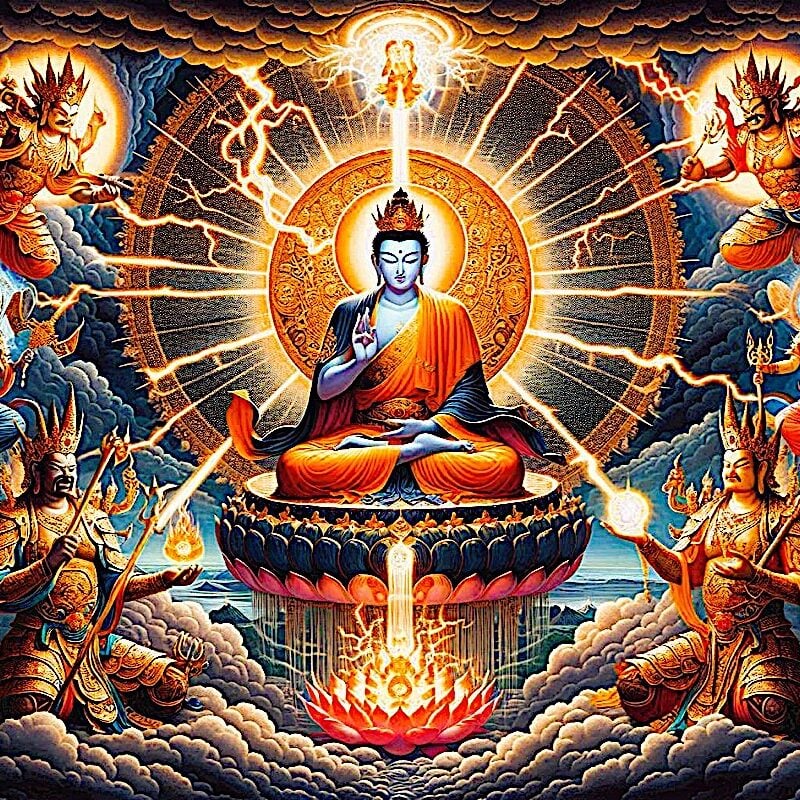
Protection from all Harm, Natural Disaster, Weather, Spirits, Evil, Ghosts, Demons, Obstacles: Golden Light Sutra: Chapter 14

Guru Rinpoche is ready to answer and grant wishes: “Repeat this prayer continuously” for the granting of wishes
Search
Latest Features
Please support the "Spread the Dharma" mission as one of our heroic Dharma Supporting Members, or with a one-time donation.
Please Help Support the “Spread the Dharma” Mission!

Be a part of the noble mission as a supporting member or a patron, or a volunteer contributor of content.
The power of Dharma to help sentient beings, in part, lies in ensuring access to Buddha’s precious Dharma — the mission of Buddha Weekly. We can’t do it without you!
A non-profit association since 2007, Buddha Weekly published many feature articles, videos, and, podcasts. Please consider supporting the mission to preserve and “Spread the Dharma." Your support as either a patron or a supporting member helps defray the high costs of producing quality Dharma content. Thank you! Learn more here, or become one of our super karma heroes on Patreon.
Lee Kane
Author | Buddha Weekly
Lee Kane is the editor of Buddha Weekly, since 2007. His main focuses as a writer are mindfulness techniques, meditation, Dharma and Sutra commentaries, Buddhist practices, international perspectives and traditions, Vajrayana, Mahayana, Zen. He also covers various events.
Lee also contributes as a writer to various other online magazines and blogs.




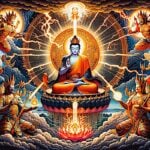

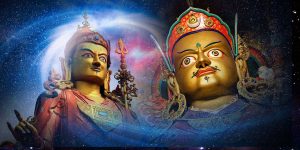

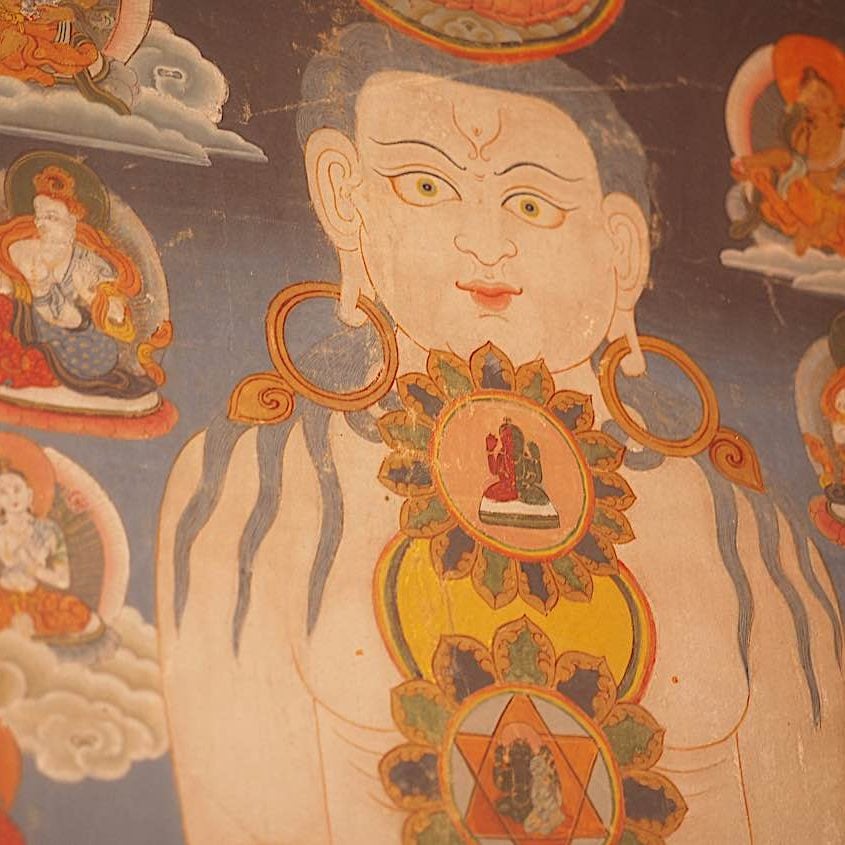
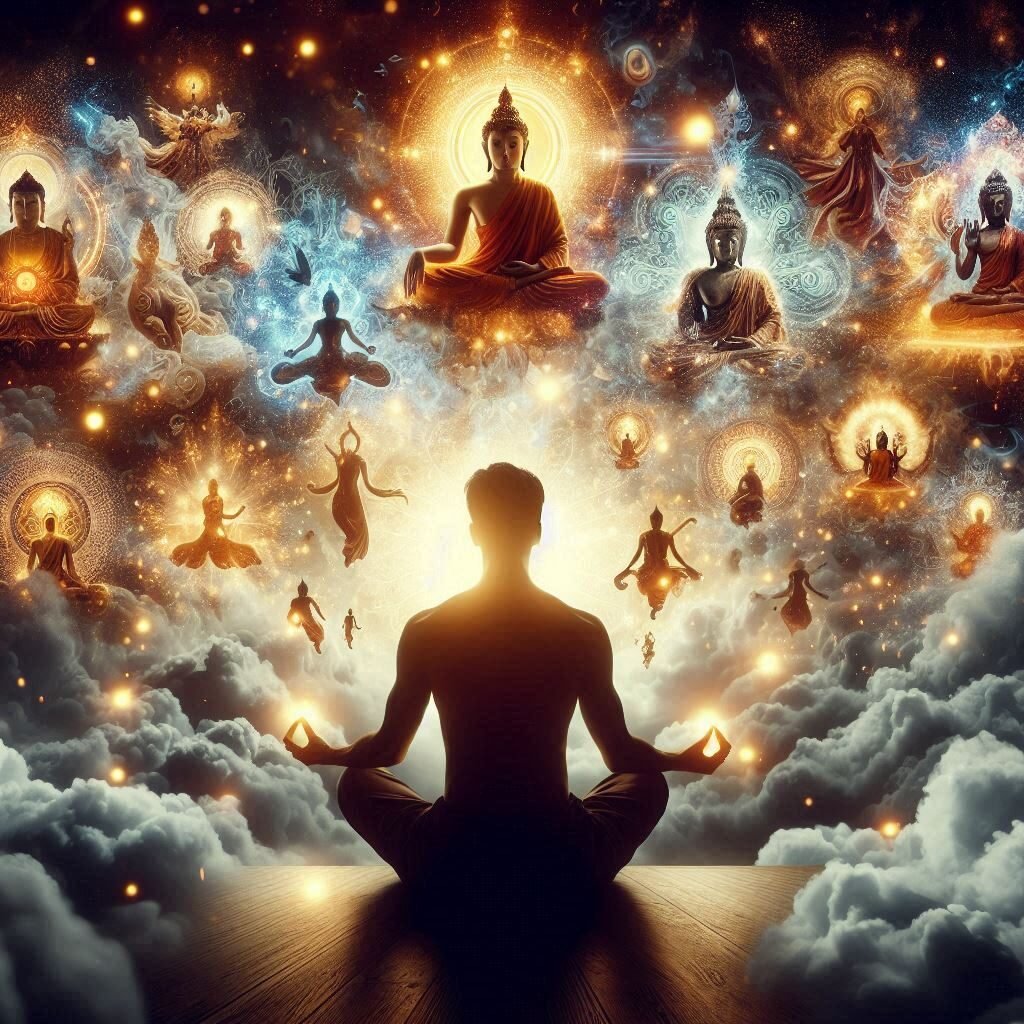
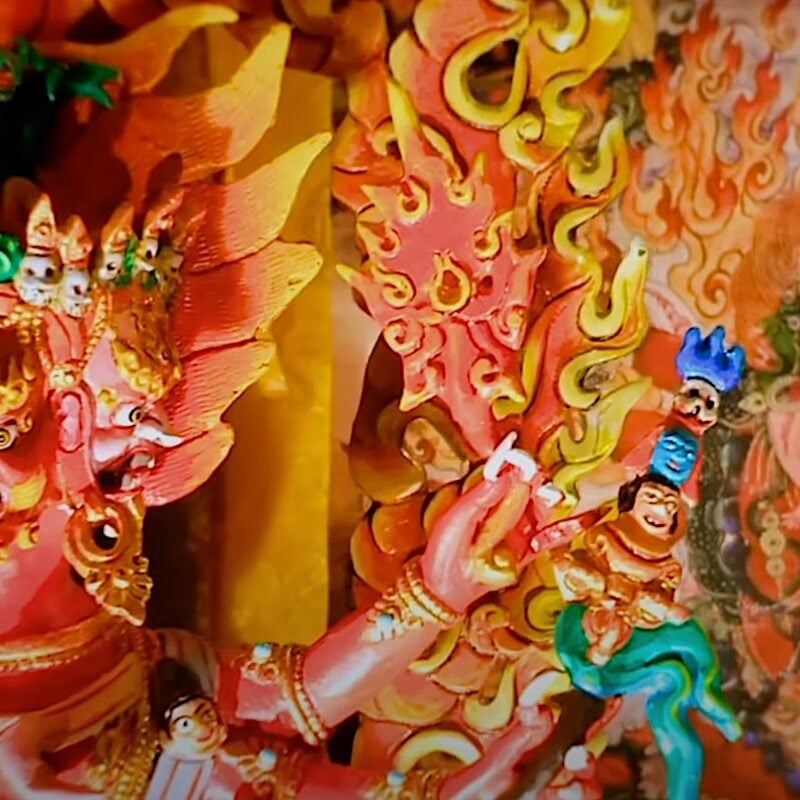

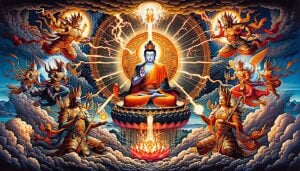



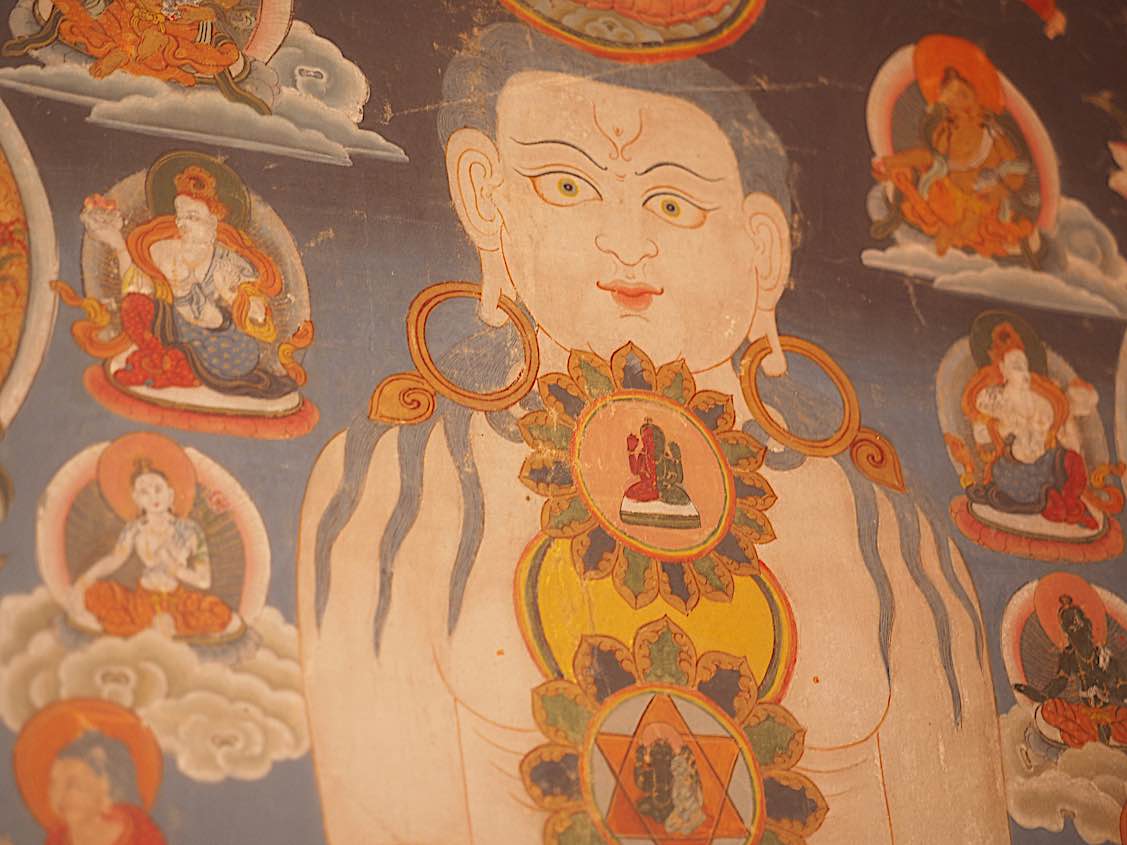
If people that write articles cared more about writing great material like you, more readers would read their content. It’s refreshing to find such original content in an otherwise copy-cat world. Thank you so much.
Thank you so much for your very kind comment! Metta, Buddha Weekly
For me this is the easiest path to liberation, having tried unsuccessfully in countless others. Paradoxically, it’s also difficult, as in, you still have to put in the work, often cultivating alone which can be tricky.
Fantastic article.
Thank you so much!